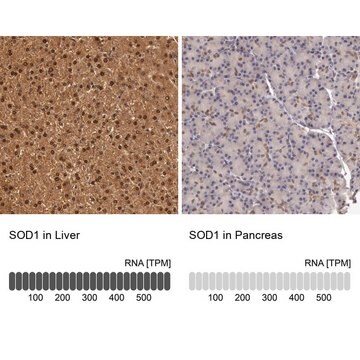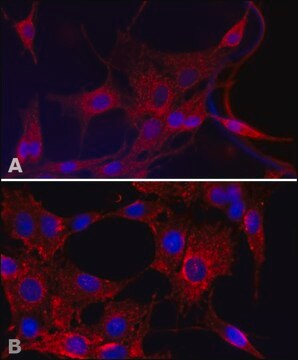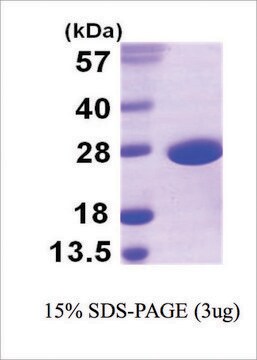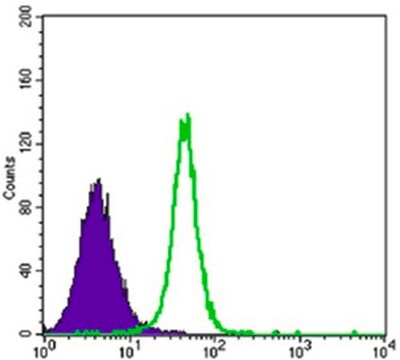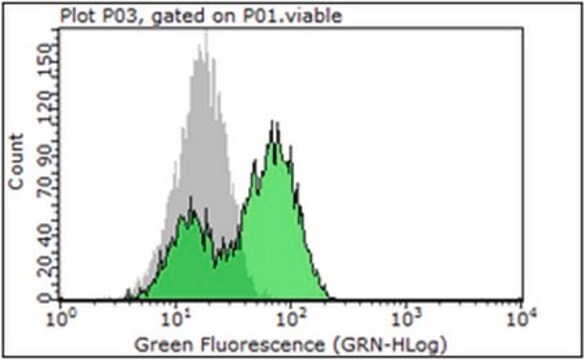おすすめの製品
由来生物
mouse
品質水準
抗体製品の状態
ascites fluid
抗体製品タイプ
primary antibodies
クローン
6F5, monoclonal
化学種の反応性
mouse, human
テクニック
flow cytometry: suitable
immunocytochemistry: suitable
western blot: suitable
アイソタイプ
IgG1
UniProtアクセッション番号
輸送温度
wet ice
ターゲットの翻訳後修飾
unmodified
遺伝子情報
human ... SOD1(6647)
詳細
Superoxide dismutase 1 (SOD1) also known as Superoxide dismutase [Cu-Zn] to distinguish it from SOD2 which uses manganese as its cofactor, is the cytosolic form of the enzyme that catalyzes the breakdown of superoxide into oxygen and hydrogen peroxide and is our primary anti-oxidant combating enzyme. SOD1 performs its function with the help of co-factors and one protein in particular is vital to its proper functioning. Copper chaperone protein (CCS) is a metalloprotein that specifically delivers Cu to SOD1 and may activate SOD1 through direct insertion of the Cu cofactor. Interestingly, defects in SOD1 are the cause of a form of ALS (Amyotrophic Lateral Sclerosis or Lou Gehrig′s disease) and much research is centered on understanding how over-active or under-active SOD1 contributes to the disease. EMD-Millipore′s Anti-SOD1 mouse monoclonal antibody has been tested in western blot on HeLa, NIH3T3, A549 and A431 cell lysates and fluorescent immunocytochemistry on PANC1, SKBR-3 and 3T3-L1 cells in culture. The antibody has also been tested in flow cytometry on A431 cells in culture.
免疫原
Purified recombinant fragment of human SOD1 expressed in E. Coli.
アプリケーション
Research Category
アポトーシス及び癌
アポトーシス及び癌
Research Sub Category
アポトーシス-追加
アポトーシス-追加
Anti-SOD1 Antibody, clone 6F5 is a highly specific mouse monoclonal antibody, that targets Superoxide Dismutase & has been tested in western blotting, ICC & Flow Cytometry.
Immunocytochemistry Analysis: A 1:200-1,000 dilution from a representative lot detected SOD1 in PANC-1, SKBR-3, and 3T3-L1 cells.
Flow Cytometry Analysis: A 1:200-400 dilution from a representative lot detected SOD1 in non serum starved A431 cells.
Optimal working dilutions must be determined by end user.
Flow Cytometry Analysis: A 1:200-400 dilution from a representative lot detected SOD1 in non serum starved A431 cells.
Optimal working dilutions must be determined by end user.
品質
Evaluated by Western Blotting in HeLa, NIH/3T3, A549, and A431 cell lysates.
Western Blotting Analysis: A 1:500-2,000 dilution of this antibody detected SOD1 in HeLa, NIH/3T3, A549, and A431 cell lysates.
Western Blotting Analysis: A 1:500-2,000 dilution of this antibody detected SOD1 in HeLa, NIH/3T3, A549, and A431 cell lysates.
ターゲットの説明
~18 kDa observed. Uncharacterized bands may appear in some lysate(s).
物理的形状
Unpurified
Mouse monoclonal IgG1 ascitic fluid containing up to 0.1% sodium azide.
保管および安定性
Stable for 1 year at -20°C from date of receipt.
Handling Recommendations: Upon receipt and prior to removing the cap, centrifuge the vial and gently mix the solution. Aliquot into microcentrifuge tubes and store at -20°C. Avoid repeated freeze/thaw cycles, which may damage IgG and affect product performance.
Handling Recommendations: Upon receipt and prior to removing the cap, centrifuge the vial and gently mix the solution. Aliquot into microcentrifuge tubes and store at -20°C. Avoid repeated freeze/thaw cycles, which may damage IgG and affect product performance.
アナリシスノート
Control
HeLa, NIH/3T3, A549, and A431 cell lysates
HeLa, NIH/3T3, A549, and A431 cell lysates
免責事項
Unless otherwise stated in our catalog or other company documentation accompanying the product(s), our products are intended for research use only and are not to be used for any other purpose, which includes but is not limited to, unauthorized commercial uses, in vitro diagnostic uses, ex vivo or in vivo therapeutic uses or any type of consumption or application to humans or animals.
Not finding the right product?
Try our 製品選択ツール.
保管分類コード
12 - Non Combustible Liquids
WGK
nwg
引火点(°F)
Not applicable
引火点(℃)
Not applicable
適用法令
試験研究用途を考慮した関連法令を主に挙げております。化学物質以外については、一部の情報のみ提供しています。 製品を安全かつ合法的に使用することは、使用者の義務です。最新情報により修正される場合があります。WEBの反映には時間を要することがあるため、適宜SDSをご参照ください。
Jan Code
MABC684:
試験成績書(COA)
製品のロット番号・バッチ番号を入力して、試験成績書(COA) を検索できます。ロット番号・バッチ番号は、製品ラベルに「Lot」または「Batch」に続いて記載されています。
Xiao-Dan Hao et al.
Scientific reports, 7(1), 13570-13570 (2017-10-21)
Keratoconus (KC) is a common degenerative corneal disease, and heredity plays a key role in its development. Although few genes are known to cause KC, a large proportion of disease-causing genes remain to be revealed. Here, we report the identification
ライフサイエンス、有機合成、材料科学、クロマトグラフィー、分析など、あらゆる分野の研究に経験のあるメンバーがおります。.
製品に関するお問い合わせはこちら(テクニカルサービス)